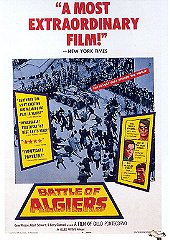The Battle of Algiers is a vigorously haunting, eye-opening cinematic recreation of Algeria's struggle for independence from France that unfolded merely a few decades ago. This is a film that's widely regarded as one of the most important productions in the history of political cinema. The events that transpired during the depicted years can only be described as harrowing.
The Battle of Algiers adopts the style of cinema vérité to retell the events with gripping documentary-style realism. The footage is therefore thoroughly convincing and memorable. Apparently the portrayal of the period is quite accurate as well - barricades around the city, dozens of soldiers donning extensive attire, makeshift clothing worn by the Algerians, etc. On top of this the faces in the cast are largely unfamiliar, mainly due to the predominant utilisation of non-actors to appear in front of the camera. The film was so incredibly realistic, in fact, that the producers felt the necessity to append a caption during the opening titles, assuring viewers that "not one foot" of actual documentary footage had been included.
Director Gillo Pontecorvo helmed several movies throughout his career, but many still regard The Battle of Algiers as his masterpiece. It isn't difficult to see why. Pontecorvo's direction for the film is so focused and unflinching that he was acknowledged with an Oscar nomination. Throughout the course of the film, Pontecorvo depicts the intensification of violence as inevitable. The police react to the embattled killing of their officers by bombing an apartment block in the Casbah. The FLN then respond with more unsystematic carnage. This effectively compels the French to institute checkpoints, fundamentally quarantining the Casbah. This forces the FLN to continue their campaign by blowing up cafés frequented by French civilians (using Arab women to plant the bombs to reduce suspicion). Soon the French are using torture as a method of identifying and locating the FLN members.
By no means does the film glorify either side. The audience's sympathy naturally lies with the Algerians. Nevertheless the film doesn't hesitate to depict the killing of innocents by either side. The Algerians are at times no better than their enemies. The French aren't portrayed as evil colonialists either. Pontecorvo appears to be suggesting that it is an historical inescapability that the Algerian citizens would rise up against colonial rule and accomplish their freedom, in line with Communist ideology.
The Battle of Algiers vividly recreates the tumultuous Algerian uprising against the occupying French force. The film is largely based on true events - although it isn't without its moments of fiction. A majority of the focus is on the French tracking down the members of the FLN. The French paratroops soon arrive, led by Colonel Mathieu (Martin). Over a number of years, the cynical Mathieu pits his wits against the Algerian freedom fighters. The French win the battle, but in the end lose the war as the Algerian people demonstrate that they will no longer be suppressed.
The film is based on a book by Saadi Yacef. During the bloody uprising, Yacef was one of the leaders of the FLN and wanted a movie to be made about the violent struggle for freedom. Eventually the film was released just a few years after Algeria had secured their independence. Due to the tenderness of the political situation, the film was banned in France for a number of years. It's this contentiousness on which the film's reputation still rests.
Jean Martin was probably the only professional actor in the entire cast. Martin handles the role of Colonel Mathieu with indelibly powerful intensity. With the actor, the film is imbued with momentum.
If one watches The Battle of Algiers in this day and age, its unruly potency has undoubtedly dated a fair bit. Blasphemous as it may be to cinema enthusiasts, the film has now been far surpassed - in both technique and execution. While the authenticity of each shot is truly eye-catching, the film occasionally struggles to engage a viewer. The director's sole misstep is the lack of emotion. This effectively cuts off our involvement with any of the characters. Therefore I found the film difficult to connect with. Also, the film sorely needs context. If you have no prior knowledge of the events, you'll find the proceedings difficult to follow. Throughout the movie there's also a lack of a spark, so to speak. The scenes on the streets are thoroughly enthralling, especially towards the end, but there's a seeming lack of focus in developing its story. Some scenes appear random, adding a degree of incoherency to the proceedings. Filmmaker Howard Hawks always said a film is "made up of a few good scenes and the rest is just getting there". With the occasional spark deficiency, there is too much "just getting there". That said, the final 30 minutes are thoroughly engrossing, absolutely remarkable and utterly heart-wrenching. If only the rest of the film were as good as this.
Overall, The Battle of Algiers is an admirably unbiased account of one of the bloodiest revolutions in modern history. The film apparently portrays the period and events with a chillingly high level of accuracy.
In 2003 the movie was screened at the Pentagon as they were seeking tips to win their current war. What they obviously didn't realise is that, in the long run, the Algerians won and the French lost. In the contemporary war on terror, the Americans are essentially doing what the French are doing. By taking tips from the movie, they're taking tips from a side that lost the struggle in the long run. Oops...
7.5/10
 Login
Login